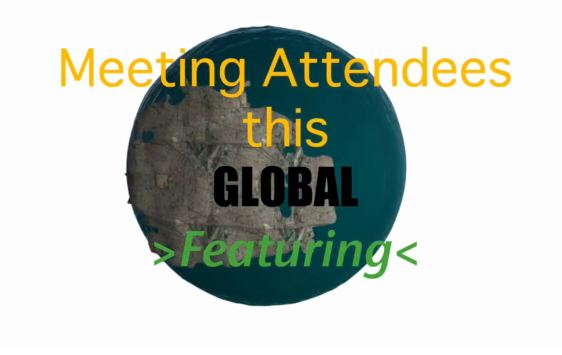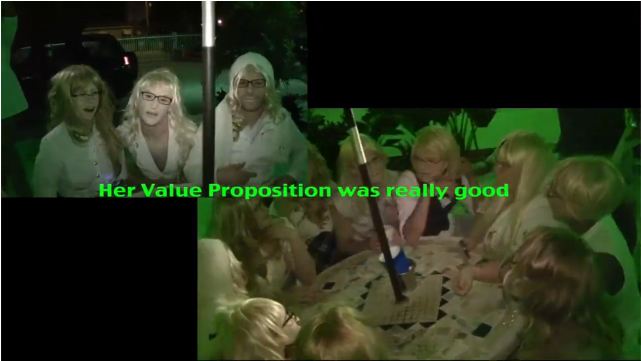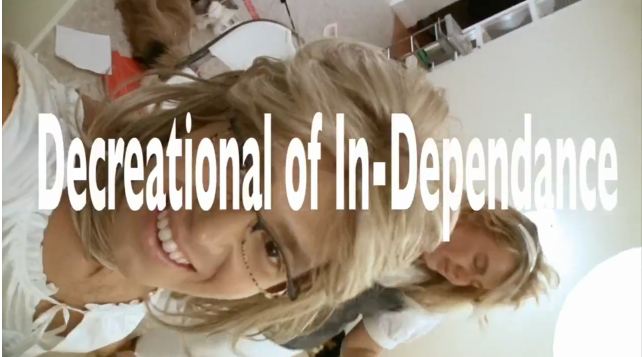
- Source: RHIZOME
- Author: Brian Droitcour
- Date: JULY 27, 2011
- Format: DIGITAL
Making Word: Ryan Trecartin as Poet

All images: Screen captures from KCorea-INC.K
Is Ryan Trecartin a video artist? A “video-installation” artist? Reviewing “Any Ever,” the exhibition now on view at MoMA PS1, Roberta Smith grasped for precedent, naming Paul McCarthy, Matthew Barney and Pipilotti Rist. But, she admitted, the comparisons fell short. To find another artist who engages a plurality of art forms with simultaneous, equal intensity—all while rethinking what art is and how it touches its audience—you’d have to go back to Wagner. Video is an outcome of his process, but watching is not the only or best way to understand it. Trecartin says he starts each work by writing a script. Language—the primal, biological system of symbols—is the model and vehicle for art and commerce and every other manifestation of social activity. And the forms of all the aspects of Trecartin’s work—the camerawork, the editing, the music, the makeup, and the costumes, as well as Lizzie Fitch’s sets for the videos and “sets” for their viewing in “Any Ever”—are prefigured in the way he works with words.

To study Trecartin’s language, I read the script for K-CoreaINC.K (Section A), which is freely available thanks to ubuweb’s “Publishing the Unpublishable” series. Like any script, it starts with dramatis personae: Argentinian Korea, Hungary Korea, French Adaptation Korea, and so on. The litany of locales recalls the lyrics of a club hit (“Brazil, Morocco, London to Ibiza”: so sings J-Lo in “On the Floor”) or the “Paris, Milan, Moscow, Tokyo” you see on the front of designer boutiques. But only remotely. Countries aren’t named to evoke the exotic, but because geographic names, unlike human names, are tied to place and awkward in reuse. Slapped together, they don’t merge nicely. One plus one is two ones and the ozone emitted by their collision. Combos like these are a favorite device of Trecartin’s. So is the willful disregard for parts of speech. A character’s “first name” can be a noun or an adjective or one of each. Grammatical difference meets geographical difference as both are jettisoned. No setting is indicated—the list of characters is enough to locate the action in an unanchored imaginary.
I’ve called the Koreas “characters” but the script say they’re “Attendees,” a designation that subordinates individual identity to temporary presence. The space-time properties of attending suit the names. These are not distinct individuals, but inflections—or international branches—of Global Korea, the star player listed at the top of the page as “Global Korea (GK): (potential Merge):”. Punctuation was invented to represent the pauses and pitches of speech; long after it moved beyond this purpose to become a set of standards for clarifying the meaning of written language, punctuation marks were remixed as emoticons when writing began to take on the phatic functions of speech. Trecartin’s unruly use of punctuation draws on all stages of its history. When, in the script’s first lines, Mexico Korea says “Yaw,,,,,,”, the comma does more than make a pause. It’s a winking eye torn from a smiling face, repeated until it’s a nervous tic. Colons join, parentheses cut, and in the designation of Global Korea’s role—before the dialogue even starts—those marks are staggered to herald K-CoreaINC.K (Section A) as a drama of belonging and difference, of where the self stands with regards to others.

Pronouns are a battlefield. “IT is not |You|,,, IT IS WE!” NAK announces. “IT is not |em| and>/ Will not matter as Such.” On the next page she says: “The New Look for This Company, IS re-Thinking the Word |Humanity| as an Object with a (Goal).” Trecartin’s use of corporate jargon brings the concrete back to “corporation,” a word that abstracts the corporeal. Dialogue is propelled by confrontations between voices of a single entity (i.e., the Koreas) and others, whose names convey difference in terms of human-resource hierarchies. A Driver—listed in the dramatis personae as “Pay Role: (2): Driver, Wait”—offers unsolicited business advice: “[…] Focus on finding REAL Consumer Demand,,/ For Cross-Over-Culture,,,,,, ?/ And Time-Shared-Ideologies ?” The suggestion is soundly rejected by Global Korea and her affiliates. He’s just a hireling, and his vision of crossovers and time-shares is too generous, too loose. There’s also an intern–“illegal outsider re-useable friend (prop)”—who goes by Jessica until USA Korea decides she’s Cindy. Either way, she’s no K. Interns are promiscuous, commingling with the corporate body for a limited time, unpaid. “Contemporary Slut!” Mexico Korea rages at Jessica/Cindy. “Every Body’s’ Got the Agenda!”



“I had to let you Go.” These words, spelled out in a 48-point typeface, occupy a whole page after Global Korea pledges: “I’m Gona Fire HER,,,,,,”. “Don’t feel Examplized,” the big words continue. “It’s just Nature.” Again, the language of human-resource management euphemizes otherness. The passive coinage “examplized” emphasizes the helplessness of the recipient “you” and sticks out as a neologism to call attention to the relative ordinariness of these lines that broach difference. “It’s just Nature”: Singling out the other is the default of consciousness. When Global Korea and her affiliates natter mutual affirmations, the language is much weirder. Global regularly pronounces compound phrases where one plus one equals three, like “3rd/World-Class.” And she issues commands like “globalize at HER!” Tacking a preposition and an object on a verb that doesn’t take any is like stuffing a dozen bodies in a single identity. [k-corea 008.jpg] “Are you finding Position? It’s such a Hunt.” This early intertitle blurs the spatial and psychological parameters of navigating between harmony with others and assertion of self. Later, Mexico Korea vacillates: “I’m an Aquarium… I’m in Aquarium.” Used with the copula the indefinite article defines a thing by its likeness to other known things. “In” expresses location. Trecartin exploits the coincidence of homophony to elide the difference between an ontological position and a physical one. Just as the corporation’s abstraction of the body is returned partially to the concrete, identity sits somewhere between a state of mind and the location of the body. Mexico Korea, meanwhile, is neither an aquarium nor in one, which highlights language’s status as the zone for creating and confronting problems of positioning.

Trecartin’s writing responds to the internet, but it defies an assertion made by Kenneth Goldsmith, poet and founder of ubuweb, who wrote that flarf and conceptual poetry are the quintessential poetic responses to the digital age because they employ cut-and-paste techniques. Flarf originated about a decade ago, when a group of poets began taking sequences of random words that spammers included in messages to fool filters, entering them in search engines, copying results, and repeating until they reaped enough material to sculpt something that looked like a poem. The method tends to produce a pretty—and often funny—swirl of words that keeps skirting meaning:
heavy, greasy, dense and low, like
lethargic sea-green gardens
with a buzz overpowering, like
modern outdoor inbredding.
You know you’re Swiss when,
when foreign visitors ask to see your
chocolate factory, you answer,
“Why don’t you and Hannibal Lecter
just kick out the jams?”
‘Cause you know you got the chamber,
the chair,
and Fear Factor
(Excerpt from “The Swiss Just Do Whatever,” by Sharon Meisner)
Goldsmith’s conceptual poetry is pure appropriation. He moves chunks of text from one place to another, without editing or poeticizing:
D8 L THE NEW YORK TIMES TUESDAY, SEPTEMBER 11, 2001
Metropolitan Forecast
today Less humid, sunshine
High 79. Noticeably less humid air will filter into the metropolitan region on. Brisk winds from the northwest. High pressure building east from the Great Lakes will promote mainly sunny skies. Daytime readings will peak in the lower 80’s.
(Excerpt from “Metropolitan Forecast” by Kenneth Goldsmith)
Goldsmith is due great respect as a thinker and archivist, but his poetry is so sterile, it’s unreadable. His method gives ordinary language the aura of an untouchable authority. He petrifies genre and meaning with it. Flarf eschews content, Goldsmith—style. Both reject traditional ideas of authorships by imitating the impersonality of machines. Trecartin keeps everything. His flamboyant use of the patterns of chat and ads and other types of cliché isn’t a direct form of copying, but a concentration of a normal condition of language use: A speaker is obliged to use words that come from outside her—and can be understood by others—while making them her own at the moment of the utterance, in order to make it seem like the utterance comes from inside her. And K-CoreaINC.K (Section A) dramatizes that condition in dialogue.


The application of the script—which can be experienced on Vimeo and at PS1—brings it to life. The polyphony of voices woven into the text unravels in the voices of the actors who speak it, who all approach their task differently. Trecartin’s own performance as USA Korea makes the prosody implied by his punctuation audible. As North America Korea, Veronica Gelbaum’s delivery is uncertain and flat, which makes her lines extra uncanny, while Raul de Nieves owns the role of Mexico Korea and spins out Spanglish cadenzas. The jerky pastiche of the writing merges with the quick cuts and hot-potato camerawork, and the diversity of speech genres is raggedly matched by a diversity of shots, from the reality-show staging of Korea Inc.’s outdoor meeting to the vlog angle of USA Korea gazing out at viewers. Domestic interiors expose the business talk as play-acting, and this element of childishness enhances the text’s tensions by evoking a tween’s hungry longing to belong. The Koreas look alike: blond wigs, white pancake makeup, white shirts. Furniture gets repeated, too, from the aggregation of Ikea lamps in the closing sequence with British Korea to the wood-veneer cupboards that greet visitors at “Any Ever.” The gallery where K-CoreaINC.K (Section A) plays at PS1 mixes shower tiles and office furniture. Along the back wall, barstools alternate with planters filled with copy paper. Elsewhere the galleries are strewn with luggage and airplane seats as well as couches and kitchenware, blending the sedentary with global movement in an atmosphere of telepresence. Mass-market things become fluid and ephemeral, subject to exaggeration, misunderstanding, repetition and play. Their origins are indistinct or irrelevant, and the same things are used in other contexts by millions of people. They are like words.

